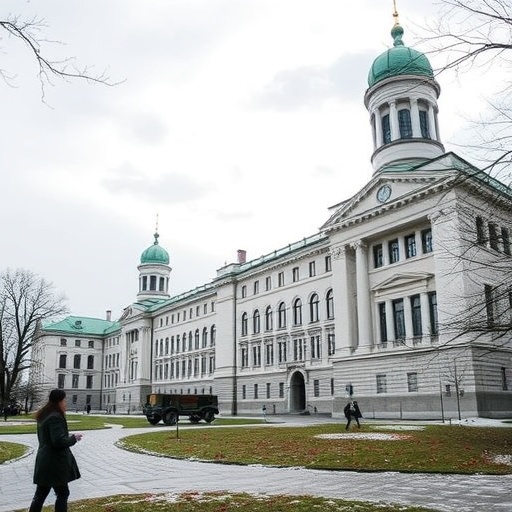The ongoing conflict between Russia and Ukraine has drastically affected various sectors, including education, in Ukraine. The situation in Lviv, a city in western Ukraine, has become a focal point for understanding how universities are coping with adversity. A recent study conducted by researchers including Błaszczyk, Kovalisko, and Pieńkowski delves deep into the resilience mechanisms employed by students at Lviv University amidst the chaos of war. This comprehensive analysis sheds light not only on the emotional and psychological impacts of conflict but also on the innovative strategies being implemented to maintain educational continuity.
The study highlights that Lviv University, like many other institutions across Ukraine, has adapted to the conditions of ongoing war through various resilience mechanisms. Students and faculty members alike have demonstrated an incredible ability to pivot and create new paradigms of learning and interaction that transcend traditional classroom boundaries. Empowered by technology, many students have found ways to continue their studies remotely, utilizing online platforms to connect with educators and peers despite the physical hardships imposed by the conflict.
Integral to their resilience has been the psychological fortitude that students and faculty display in the face of adversity. Interviews conducted reveal that community support networks have flourished during this time, with students often leaning on each other for emotional support and academic assistance. These networks not only provide a buffer against stress but also foster a sense of belonging and solidarity among individuals navigating the harrowing realities of war together.
Moreover, the research underscores the impact of local governance and institutional policies on student resilience. Universities have been compelled to become more flexible and responsive to the urgent needs of their students. Lviv University’s administration has implemented policies designed to enhance student welfare, including access to mental health resources and academic accommodations. These measures not only reduce pressure on students but also cultivate an environment where learning can continue to thrive, despite setbacks.
The role of faculty in promoting resilience cannot be overstated. Educators have adapted their teaching styles to be more empathetic and aware of the struggles their students are facing. They are engaging in open dialogues about the feelings of fear and uncertainty that permeate the student body. This pedagogical shift is crucial for creating a safe and supportive educational environment when external circumstances are anything but stable.
Finding ways to maintain a semblance of normalcy in education during times of crisis is vital. The research shows that many students have sought refuge in academic pursuits as a means of coping. Engaging in scholarly activities serves not only as a distraction but also as an opportunity for personal growth. Many report feeling a sense of purpose when immersed in their studies, further underlining the therapeutic role of education during tumultuous times.
Additionally, the study emphasizes the innovation catalyzed by the conflict. As institutions are pushed to their limits, creative and resourceful approaches to learning have emerged. Blended learning models that integrate in-person and online education are gaining popularity, allowing for greater flexibility and access for students from varying circumstances, particularly those displaced within and outside of Ukraine due to the ongoing war.
The findings also talk about the use of social media platforms as avenues for educational exchanges and community-building. Students are leveraging these platforms to share resources, collaborate on projects, and provide each other with updates about their communities. This has not only facilitated knowledge dissemination but has also played a crucial role in maintaining relationships that are key to emotional support.
Resilience in this context is not merely about survival but is seen as a proactive engagement with one’s situation. The research presents a compelling argument that through active participation in their education, students are not only retaining knowledge but are also strengthening their capacity to adapt and thrive in adverse conditions. This dynamic interplay of resilience and education poses powerful implications for how educational institutions can better prepare for future disruptions.
The study does not shy away from the harsh realities faced by students during conflict, including displacement, trauma, and loss. However, it also champions the spirit of resilience that defines Ukrainian students. Their capacity to find strength in adversity is a testament to the enduring power of the human spirit, an element that forms the backbone of the educational journey amidst conflicts like the ongoing war in Ukraine.
In conclusion, the mechanisms of resilience observed at Lviv University serve as vital lessons for global educational systems facing crises. By nurturing adaptive capabilities and fostering supportive environments, academic institutions can help students not only to endure but to flourish, even in the face of unprecedented challenges. As the conflict continues, the insights garnered from this research will undoubtedly offer critical strategies for educators and policymakers aiming to uphold the integrity of education in turbulent times.
This study ultimately presents a nuanced portrayal of resilience shaped by real human experiences amidst conflict. It stands as a stark reminder of both the trials faced and the triumphs achieved by the individuals who constitute the educational fabric of Ukraine. The determination to learn and support one another may very well be the key to holding onto hope, even as the shadows of war loom large.
Subject of Research:
Article Title: Coping with adversity: mechanisms of resilience in Ukrainian universities during the Russian-Ukrainian War—a perspective from Lviv University students.
Article References:
Błaszczyk, M., Kovalisko, N., Pieńkowski, P. et al. Coping with adversity: mechanisms of resilience in Ukrainian universities during the Russian-Ukrainian War—a perspective from Lviv University students.
High Educ (2025). https://doi.org/10.1007/s10734-025-01506-z
Image Credits: AI Generated
DOI:
Keywords: Resilience, Ukrainian universities, Lviv University, Russian-Ukrainian War, educational continuity, mental health, coping strategies.




